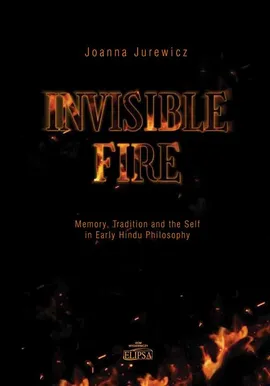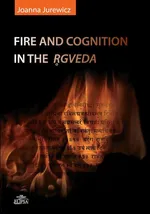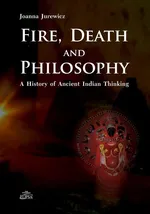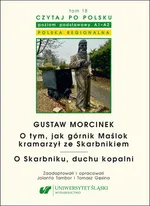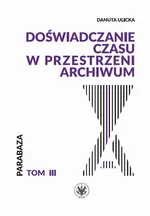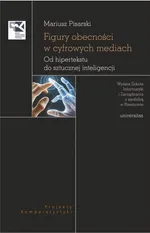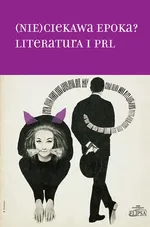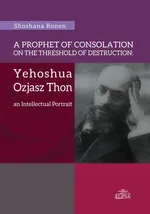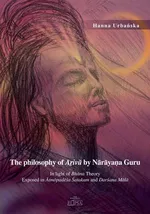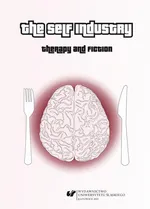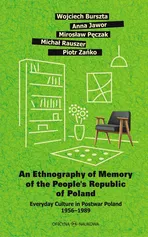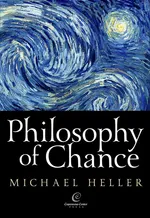- Kategorie:
- Język wydania: angielski
- ISBN: 978-83-8017-311-8
- ISBN druku: 978-83-8017-311-8
- Liczba stron: 652
-
Sposób dostarczenia produktu elektronicznegoProdukty elektroniczne takie jak Ebooki czy Audiobooki są udostępniane online po uprzednim opłaceniu (PayU, BLIK) na stronie Twoje konto > Biblioteka.Pliki można pobrać zazwyczaj w ciągu kilku-kilkunastu minut po uzyskaniu poprawnej autoryzacji płatności, choć w przypadku niektórych publikacji elektronicznych czas oczekiwania może być nieco dłuższy.Sprzedaż terytorialna towarów elektronicznych jest regulowana wyłącznie ograniczeniami terytorialnymi licencji konkretnych produktów.
-
Ważne informacje techniczne
-
Minimalne wymagania sprzętowe:
- procesor: architektura x86 1GHz lub odpowiedniki w pozostałych architekturach
- Pamięć operacyjna: 512MB
- Monitor i karta graficzna: zgodny ze standardem XGA, minimalna rozdzielczość 1024x768 16bit
- Dysk twardy: dowolny obsługujący system operacyjny z minimalnie 100MB wolnego miejsca
- Mysz lub inny manipulator + klawiatura
- Karta sieciowa/modem: umożliwiająca dostęp do sieci Internet z prędkością 512kb/s
-
Minimalne wymagania oprogramowania:
- System Operacyjny: System MS Windows 95 i wyżej, Linux z X.ORG, MacOS 9 lub wyżej, najnowsze systemy mobilne: Android, iPhone, SymbianOS, Windows Mobile
- Przeglądarka internetowa: Internet Explorer 7 lub wyżej, Opera 9 i wyżej, FireFox 2 i wyżej, Chrome 1.0 i wyżej, Safari 5
- Przeglądarka z obsługą ciasteczek i włączoną obsługą JavaScript
- Zalecany plugin Flash Player w wersji 10.0 lub wyżej.
-
Informacja o formatach plików:
- PDF - format polecany do czytania na laptopach oraz komputerach stacjonarnych.
- EPUB - format pliku, który umożliwia czytanie książek elektronicznych na urządzeniach z mniejszymi ekranami (np. e-czytnik lub smartfon), dając możliwość dopasowania tekstu do wielkości urządzenia i preferencji użytkownika.
- MOBI - format zapisu firmy Mobipocket, który można pobrać na dowolne urządzenie elektroniczne (np.e-czytnik Kindle) z zainstalowanym programem (np. MobiPocket Reader) pozwalającym czytać pliki MOBI.
- Audiobooki w formacie MP3 - format pliku, przeznaczony do odsłuchu nagrań audio.
-
Rodzaje zabezpieczeń plików:
- Watermark - (znak wodny) to zaszyfrowana informacja o użytkowniku, który zakupił produkt. Dzięki temu łatwo jest zidentyfikować użytkownika, który rozpowszechnił produkt w sposób niezgodny z prawem.
- Brak zabezpieczenia - część oferowanych w naszym sklepie plików nie posiada zabezpieczeń. Zazwyczaj tego typu pliki można pobierać ograniczoną ilość razy, określaną przez dostawcę publikacji elektronicznych. W przypadku zbyt dużej ilości pobrań plików na stronie WWW pojawia się stosowny komunikat.
Invisible Fire Memory Tradition and the Self in Early Hindu Philosophy
(eBook)-
Druk: Warszawa, 2021
-
Wydanie/Copyright: wyd. 1
-
Autor: Joanna Jurewicz
-
Wydawca: Elipsa Dom Wydawniczy
-
Formaty:
PDF (Watermark)WatermarkZnak wodny czyli Watermark to zaszyfrowana informacja o użytkowniku, który zakupił produkt. Dzięki temu łatwo jest zidentyfikować użytkownika, który rozpowszechnił produkt w sposób niezgodny z prawem. Ten rodzaj zabezpieczenia jest zdecydowanie najbardziej przyjazny dla użytkownika, ponieważ aby otworzyć książkę zabezpieczoną Watermarkiem nie jest potrzebne konto Adobe ID oraz autoryzacja urządzenia.
Invisible Fire Memory Tradition and the Self in Early Hindu Philosophy
This book consists of five chapters. In the first chapter, we look at early Sm?ti cosmogonies presented in MS 1 and MDhP 175–176, 240. It is argued that the creation of the world is seen as a cognitive act during which one reality manifests its aspect within which it cognises itself in subject-object cognition. Ontic changes are the results of epistemic transformations. The Composer of the MS presents a coherent model the levels of which corresponds to levels of creation of the self, beginning with mental abilities, then abilities for sensual cognition and finally the body endowed with the ability to move. The selves of reality are as follows: the cosmos, ritual, society, man and unmanifest reality present within them. All these manifestations are conceived in terms of man.
In the second chapter we discuss the implications of creation conceived as presented in the first chapter. It will be shown that adopting the assumption about the primarily cognitive nature of creation allows for a new look at the ontology presented in the early Sm?ti. Its basic implication are two perspectives as to how reality can be described. These two perspectives are already described by Yajnavalkya in BU 3–4.
The third chapter is devoted to a discussion of wrong cognition. It is argued that philosophical anthropology can be explained on the basis of the subject-object cognition scenario in terms of which the functioning of the cosmos is conceived. Wrong cognition causes man to treat the epistemic division of reality as ontic and himself as an ontically separate subject. Since cognition precedes being the way man thinks has ontic results.
In the fourth chapter, we consider liberating cognition which is the opposite process to wrong cognition and consists of the decompression of the amalgamate agent, the radical transformation of consciousness and a change of cognitive perspectives from the perspective of the particular subject to the
perspective of reality. We can call this the process of ‘subjectivisation’. It begins with the proper desire to cognise oneself i.e., the unmanifest self of man.
The fifth chapter is an analysis of the early Sm?ti thought using some theories proposed in the humanities. The first two are developed within the framework of cognitive linguistics.. The third section of this chapter is devoted to the analysis of the theories of play (beginning with Johan Huizinga), philosophy (Eugen Fink, Hans-Georg Gadamer) and psychoanalysis (Donald Winnicott) and the possible use of these approaches to analyse early Sm?ti thought. In the fourth section, we look at the concept of karman through the lens of the theory of responsibility proposed by Roman Ingarden to show the moral dimension of the early Hindu theory of action.
-
Inne autora
-
Inne z kategorii
-
Inne wydawcy










